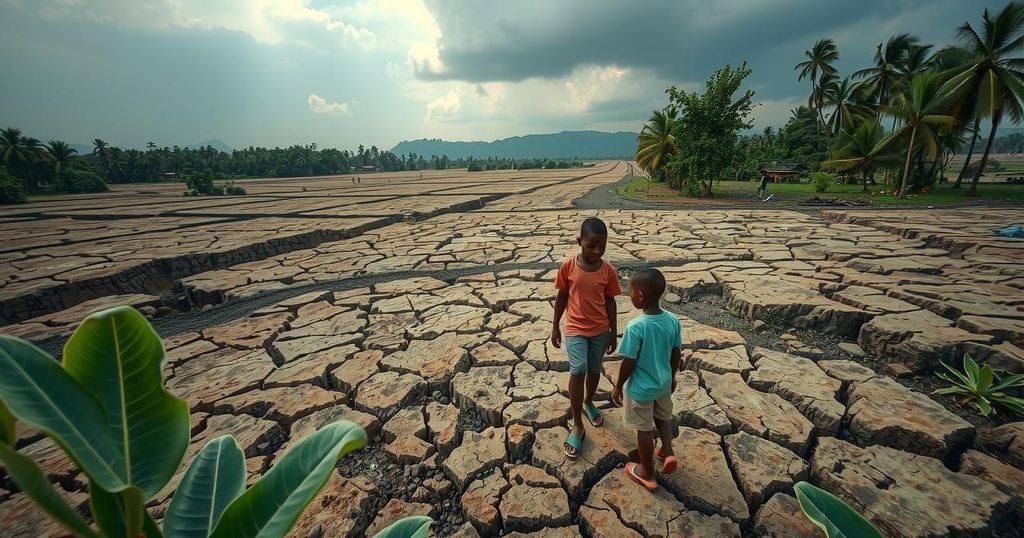World news
AMAZON, ASIA, AZERBAIJAN, BAKU, BE, BRAZIL, CATHERINE RUSSELL, CLIMATE CHANGE, COPERNICUS CLIMATE CHANGE SERVICE, DISASTER RELIEF, EARTH OBSERVATORY, EU, EUROPEAN UNION, FOOD SECURITY, MEXICO, NASA, NASA ’ S EARTH OBSERVATORY, NATURAL DISASTERS, NORTH AMERICA, PHILIPPINES, SOUTH AMERICA, SPACE, UN, UN CHILDREN ’ S FUND, UN UNICEF, UNICEF, UNITED NATIONS, UNITED STATES SPACE
Fatima Alavi
0 Comments
UNICEF Reports Over 420,000 Children Affected by Amazon Drought
The UN reports that over 420,000 children are facing critical water shortages in the Amazon due to ongoing drought conditions. UNICEF calls upon world leaders at the COP29 summit to increase climate financing dedicated to protecting affected children. Environmental degradation and lack of access to essential resources threaten the health and wellbeing of communities in Brazil, Colombia, and Peru, highlighting the urgent need for global action.
The unprecedented drought in the Amazon basin has left over 420,000 children vulnerable to severe water shortages and food insecurity, according to UNICEF. This crisis, which has persisted since last year, is impacting Indigenous communities in Brazil, Colombia, and Peru who rely on waterways. The impending COP29 climate summit in Azerbaijan poses a critical opportunity for leaders to address the urgent need for increased climate financing specifically allocated for children affected by climate change. UNICEF Executive Director Catherine Russell emphasized that families are suffering due to the degradation of crucial ecosystems, which deprives children of essential resources such as food, clean water, health care, and education. The organization has identified that the food insecurity exacerbated by drought contributes to heightened risks of malnutrition among children, as diminished water supplies can lead to a surge in infectious diseases. In Brazil alone, over 1,700 schools and 760 medical clinics have been rendered inaccessible due to low river levels. The ongoing drought, attributed to the 2023-2024 El Niño phenomenon, is triggering a cascade of ecological and societal disruptions, including increased forest fires and negative impacts on hydroelectric power generation. While Brazil reports a 30 percent decrease in deforestation, challenges remain, and the urgent need for concerted international action is clear. UNICEF has requested $10 million to support the affected communities by providing vital drinking water and deploying health brigades. Collaborative efforts and strategic funding are imperative for mitigating the adverse effects of climate change on current and future generations.
The Amazon rainforest, which is vital for global ecology, has been severely impacted by climate change and environmental degradation. Recent droughts have reached record levels, severely affecting communities that depend on the region’s freshwater resources. As climate phenomena like El Niño exacerbate water scarcity, organizations such as UNICEF are advocating for immediate action to protect vulnerable populations, particularly children. Amid these challenges, discussions at global climate summits like COP29 aim to define funding strategies that prioritize the well-being of children and sustainable environmental practices.
In summary, the severe drought in the Amazon basin has placed over 420,000 children at risk due to water scarcity and food insecurity. With the upcoming COP29 summit, global leaders are urged to commit substantial climate financing to protect these vulnerable communities. UNICEF’s call for immediate support highlights the dire situation families are facing, necessitating prompt action to provide essential resources and mitigate further health risks. Collaborative international efforts can foster resilience against climate-induced adversities affecting the Amazon and its inhabitants.
Original Source: www.aljazeera.com




Post Comment